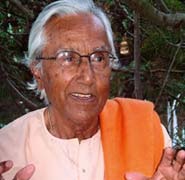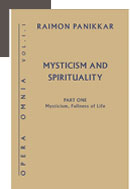

el sitio oficial


Mysticism, Fullness of Life
Vol. I, Part One
Opera Omnia
Marykmoll, New York (ORBIS BOOKS) 2014
Philosopher, religious expert, theologist, man of dialogue between cultures and a bridge between the West and India, Panikkar chose mysticism as the subject for the first part of his Opera Omnia: Mysticism, the Fullness of Life.
Two possible questions that this subject might arouse are “With all the things he has written, did he have to begin with a phenomenon that is so singular, so borderline, so almost excessive?”, and “Why begin from the end, from that attainment that is so sublime and limited to so few?” The first question is of a secular, somewhat sceptical nature, while the second is more religious/spiritual. From whatever angle mysticism is viewed it tends to be seen as something excessive - to some almost annoying and pathological, to others unattainable and sublime. Panikkar, and with him an important tradition of religious thought produced by the major religions, including Christianity itself, turns around for us the difficult questions of mysticism. Mysticism is neither an eccentricity nor a performance for the exceptionally gifted; it is a fundamental dimension of Man. Man is not made to live by bread alone, but to cultivate his relationship with the Mystery. Man constantly questions the Mystery and the supernatural, even when he denies it. It is through mysticism that dialogue – mutual understanding between religions and cultures – most directly realises the mystical and original dimension in each of us. Man reflects on the meaning of life and opens up to the Mystery, the ineffable. Mysticism is the fullness of mankind, and without this dimension Man would be impoverished.
The composition of the volume is simple: a first part has the title of The New Innocence, as authentic mysticism is not a reflection on Being, but a free and spontaneous attitude welling up from the person’s fullness.
A second part deals with meditation, on which little can be said for it is silence. Three examples from saints follow: their differences show how there is no single concept of sainthood.
The third part consists of a systematic and philosophical study of the mystical experience. This is where I attempt to confute the rather widespread idea of mysticism as an extraordinary phenomenon reserved to a small elite of mortals. We all are potentially opened to the mystical experience. The idea that we all are “God’s children” in so many religions has received a christian formulation and is constantly repeated but little meditated upon. I added as an appendix a philosophical reflection on the supreme experience from various perspectives as well as a prayer from my innermost being.
